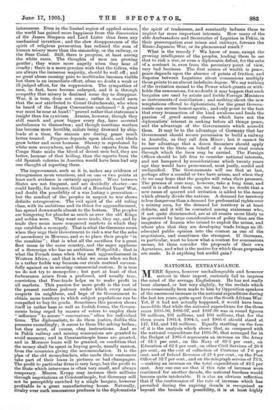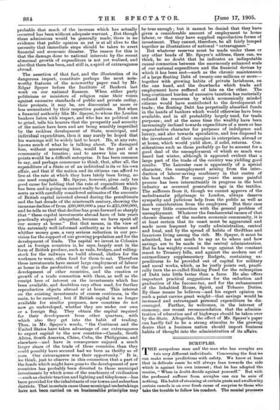- NATIONAL EXTRAVAGANCE.
MERE figures, however unchallengeable and however serious in their import, curiously fail to impress the mind of the average Englishman. He has not really been alarmed, or but very slightly, by the recitals which have occasionally been made to him by Opposition speakers of the enormous increase in the national expenditure during the last ten years, quite apart from the South African War. Yet, if it had not actually happened, it would have been incredible that while the national expenditure for the three years 1895-96, 1896-97, and 1897-98 was in round figures 98 millions, 101 millions, and 103 millions, that for the three years 1903-4, 1904-5, and 1905-6 should stand at 147, 142, and 142 millions. Equally startling on the face of it is the analysis which shows that, as compared with the national expenditure for 1895-96, that arranged for id the Budget of 1905-6 represents an increase on the Army of 61.5 per cent., on the Navy of 69.3 per cent., on Education of 62.2 per cent., on other Civil Services of 26.8 per cent., on the cost of collection of Customs of 7.6 per cent. and of Inland Revenue of 21.4 per cent., on the Post Office of 52.7 per cent., and on the telegraph service of 73.9, —making an increase on the total expenditure of 43.5 per cent. Any one can see that if this rate of increase were continued for another decade, the national burdens would. become quite intolerable. It is also an obvious reflection that if the continuance of the rate of increase which has prevailed during the expiring decade is recognised as beyond the bounds of - possibility, it is -at least -highly probable that much of the increase which has actually occurred has been without adequate warrant. But though these admissions would be generally made, there is no evidence that public opinion as yet is at all alive to the necessity that immediate steps should be taken to avert financial and economic disaster. The reason for this is that the damage done to national interests by the recent abnormal growth of expenditure is not yet realised, and also that there has been, and still is, a spirit of extravagance abroad.
The assertion of that fact, and the illustration of its dangerous import, constitute perhaps the most note- worthy features of the noteworthy paper read by Mr. Edgar Speyer before the Institute of Bankers last week on our national finances. When either party politicians or ministers of religion raise their voices against excessive standards of public and private outlay, their protests, it may be, are discounted as more or less necessitated by their respective positions. But when a financial authority like Mr. Speyer, to whom the London bankers listen with respect, and who has no political axe to grind, tells his hearers that the prosperity and security of the nation have been and are being sensibly imperilled by the reckless development of State, municipal, and individual expenditure, then it may surely be hoped that his warnings will be widely laid to heart. He, at any rate, knows much of what he is talking about. To disregard him, without answering him, would be the part of a community of lunatics ; and to answer him on most points would be a difficult enterprise. It has been common to say, and perhaps commoner to think, that, after all, the expenditure of a State or of an individual is its or his own affair, and that if the nation and its citizens can afford to live at the rate at which they have lately been living, no one need complain. Mr. Speyer, however, gives only too good cause for holding that the rate of expenditure which has been and is going on cannot really be afforded. He pre- sents us with carefully considered estimates of the amounts of British capital invested abroad during the penultimate and the last decade of the nineteenth century, showing the immense decline of from £60,000,000 a year to X25,000,000, and he tells us that that decline has gone forward so sharply that " these capital investments abroad have of late years practically stopped altogether, because we have spent all our money at home." But that means, in the view of this. extremely well-informed authority as to whence and whither money goes, a very serious reduction in our pro- vision for the support of our growing population and for the development of trade. The capital we invest in Colonies and in foreign countries is, he says, largely sent in the form of British produce, such as rails, bridges, and rolling- stock for the railways we build abroad, clothes for the workmen to wear, often food for them to eat. Therefore these investments have meant large employment of labour at home in the production of the goods sent out for the development of other countries, and the creation or growth of a trade connection with them, as well as the receipt here of interest on the investments which has been available, and doubtless very often used, for further reproductive objects abroad or at home. This interest on the existing investments of course continues, in the main, to be received ; but if British capital is no longer available for similar purposes, new countries do not now go undeveloped, whether they are under our own or a foreign flag. They obtain the capital required for their development from other quarters, with which also they get into the habit of trading. Thus, in Mr. Speyer's words, " the Continent and the United States have taken advantage of our extravagance to export capital to the new countries—Canada, South Africa, South America, China, Cuba, the Philipphies, and elsewhere—and have in consequence enjoyed a much larger share of the trade of these countries. than they could possibly have secured had we been as thrifty as of yore. Our extravagance was their opportunity." It is, we think, just to observe in this connection that a part of the funds which might have gone to the development of new countries has probably been diverted to those municipal investments by which some of the machinery of civilisation —such as electric traction and lighting and telephones—has been provided for the inhabitants of our towns and suburban diitricts. That in certain cases these municipal undertakings hate not been carried on on businesslike principles may be true enough ; but it cannot be denied that they have given a considerable amount of employment to home labour, or that they have supplied reproductive forms of investment. They cannot, therefore, be all fairly lumped together as illustrations of national " extravagance." But whatever reserves must be made under these or any other heads of Mr. Speyer's address, there can, we think, be no doubt that he indicates an indisputable causal connection between the enormously enhanced scale of our national expenditure and the financial devices by which it has been met—such as the chronic maintenance of a large floating Debt of twenty-one millions or more— together with growing habits of private lavishness, on the one hand, and the drawbacks which trade and employment have suffered of late on the other. The long-continued burden of excessive taxation has materially reduced the resources by which economically minded. citizens would have contributed to the development of trade ; the floating Debt has perpetually absorbed funds in the hands of bankers which would otherwise have been available, and in all probability largely used, for trade purposes ; and at the same time the wealthy have been increasingly inclined towards expenditure of a more or less unproductive character for purposes of indulgence and luxury, and also towards speculation, and less disposed to the investment of their margins in enterprises, abroad or at home, which would yield slow, if solid, returns. Con- siderations such as these probably go far to account for a good deal of the unemployment of which so much was heard last winter, although it appeared evident that a large part of the trade of the country was yielding good results. The Leicester case is apparently of a special character, the unemployment arising from the intro- duction of labour-saving machinery in that centre of the boot trade. For many years the same painful process has been intermittently in progress in the boot industry as occurred generations ago in the textiles. The sufferers from it, though we cannot approve of the melodramatic pilgrimage to London, always deserve sympathy and judicious help from the public as well as much consideration from the employers. But their case has very little connection with the general problem of unemployment. Whatever the fundamental causes of that chronic disease of the modern economic community, it is at least certain that its onset must be aggravated. and made more frequent by costly administration, central and local, and by the spread of habits of thriftless and luxurious living among the rich. Mr. Speyer, it must be admitted, has not much to say as to where and how savings are to be made in the central administration. But he has weighty counsel to urge against 'the constant resort to Treasury bills, and against the modern use of extraordinary supplementary Budgets, containing ex- penditures to be provided out of capital for military and naval works, which, as he justly points out, practi- cally turn the so-called Sinking Fund for the redemption of Debt into little better than a farce. He also offers important practical suggestions for the reduction and graduation of the Income-tax, and for the enhancement of the Inhabited House, Spirit, and Tobacco Duties. By these means he believes—and his expert opinion on such a point carries great weight—that savings would be increased and extravagant personal expenditure be dis- couraged. Further, he welcomes, in the interest of economy, our recent recommendation that the adminis- tration of education and of highways should be taken over by the State. Altogether, the effect of Mr. Speyer's paper can hardly fail to be a strong stimulus to the growing desire that a business nation should import business habits of thought into the administration of its affairs.







































 Previous page
Previous page